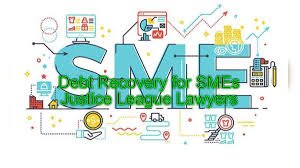

Winning the Battle Against Debt: The Ultimate Legal Guide to SME Recovery
Introduction
Small And Medium Enterprise Debt Recovery;
Debt recovery is a critical component of business sustainability, especially for small and medium enterprises (SMEs). In the dynamic and often challenging economic landscape of Nigeria, SMEs play a crucial role in driving growth, creating jobs, and fostering innovation. However, one of the significant challenges these businesses face is managing their receivables and ensuring that debts owed to them are recovered efficiently and effectively. At Chaman Law Firm, we understand the unique challenges SMEs encounter and offer specialized legal services to aid in the debt recovery process.
In the evolving landscape of commerce, Small and Medium Enterprises (SMEs) serve as the cornerstone of economic development in both developed and developing countries. However, one of the most persistent threats to their survival and growth is the inability to recover outstanding debts. When clients delay or default on payments, it creates a domino effect that can jeopardize the operational stability of these enterprises. This is especially true in regions where access to working capital is already constrained, and cash flow management can make or break a business.
The significance of effective debt recovery mechanisms cannot be overstated. It is not merely a matter of retrieving what is owed—it’s about upholding legal and contractual rights, preserving business relationships, and ensuring long-term sustainability. For many SMEs, delayed payments could mean unpaid salaries, inability to fulfill supplier contracts, stunted growth, and in worst-case scenarios, insolvency or business closure.
But debt recovery for SMEs is not a one-size-fits-all process. It is a legal journey fraught with pitfalls, from poorly drafted contracts to procedural delays in court systems. Many entrepreneurs, despite their ingenuity and drive, often lack the legal awareness or resources to enforce their rights through appropriate channels. In Nigeria, for instance, legal infrastructure has made strides, but SMEs still face unique challenges when navigating the judicial process. Lengthy litigation timelines, enforcement issues, and high legal fees are just some of the hurdles to contend with.
This article offers a comprehensive legal perspective on debt recovery for SMEs. We will explore the strategic use of legal tools—from contract clauses and dispute resolution mechanisms to court procedures and enforcement of judgments. You’ll discover practical steps for ensuring your business is prepared for potential debtor issues and equipped to act swiftly and legally when they arise. Moreover, we’ll examine the role of professional debt recovery services and the balance between aggressive collection and maintaining business rapport.
Whether you’re an SME owner facing persistent non-payment, a legal advisor to growing enterprises, or an investor seeking to understand risk management better, this guide is your roadmap to winning the battle against debt through sound legal practices. The good news is that you’re not powerless—legal remedies exist, and when used effectively, they can be transformative.
Let’s begin with a breakdown of what debt recovery entails for SMEs, the legal framework that supports it, and how small businesses can proactively protect themselves in their contractual engagements.
The Importance of Debt Recovery for SMEs
For SMEs, cash flow is the lifeblood of their operations. Unlike larger corporations, SMEs often operate on tighter margins and have limited access to credit. This makes the timely recovery of debts critical. Unpaid debts can lead to severe liquidity issues, hinder operational capabilities, and, in extreme cases, lead to insolvency.
Effective debt recovery helps SMEs maintain their financial health, allowing them to invest in growth opportunities, manage day-to-day operations, and ensure the sustainability of their businesses. Additionally, a robust debt recovery strategy helps build a culture of accountability among clients and customers, reducing the incidence of defaults.
Challenges in Debt Recovery for SMEs
Debt recovery for SMEs in Nigeria involves several challenges, including:
1. Limited Resources: SMEs often lack the financial and human resources to pursue debt recovery aggressively. This can result in prolonged periods of unpaid invoices, impacting their cash flow.
2. Legal Knowledge: Navigating the legal landscape for debt recovery requires specialized knowledge. Many SMEs do not have in-house legal teams and may find it challenging to handle legal proceedings.
3. Cost of Litigation: The cost of pursuing litigation can be prohibitive for SMEs. Legal fees, court costs, and the potential for prolonged legal battles can deter SMEs from pursuing debt recovery through the courts.
4. Customer Relations: SMEs often have close relationships with their customers. Aggressive debt recovery tactics can strain these relationships, leading to loss of business and reputation.
Legal Framework for Debt Recovery in Nigeria
Debt recovery in Nigeria is governed by various laws and regulations. Understanding these legal frameworks is crucial for SMEs to navigate the debt recovery process effectively.
1. Contract Law: The basis of any debt recovery process is the underlying contract between the SME and its debtor. Ensuring that contracts are well-drafted, clear, and enforceable is the first step in effective debt recovery.
2. Recovery of Premises Act: This law provides a legal framework for the recovery of premises and related debts. It is particularly relevant for SMEs involved in leasing or rental businesses.
3. Companies and Allied Matters Act (CAMA): CAMA governs corporate entities in Nigeria, including provisions related to insolvency and liquidation, which are relevant in debt recovery.
4. Bankruptcy and Insolvency Act: This act provides a framework for handling insolvent debtors and allows creditors to recover debts through the liquidation of the debtor’s assets.
5. Arbitration and Conciliation Act: This act promotes the use of arbitration and conciliation as alternative dispute resolution mechanisms, which can be cost-effective and quicker compared to traditional litigation.
Strategies for Effective Debt Recovery
At Chaman Law Firm, we employ a variety of strategies to enhance the effectiveness of debt recovery for SMEs. These strategies are tailored to the specific circumstances of each case and include:
1. Pre-Litigation Negotiation: Engaging with debtors before resorting to litigation can often lead to more efficient and amicable resolutions. Our approach involves thorough analysis and strategic negotiations aimed at achieving settlements that are favorable to our clients.
2. Litigation: When negotiations fail, litigation becomes necessary. We provide robust representation in court, leveraging our deep understanding of debt recovery laws to secure favorable judgments.
3. Asset Tracing and Recovery: Identifying and recovering hidden or transferred assets is critical in cases where debtors attempt to evade repayment. Our team employs advanced techniques in asset tracing to locate and recover these assets.
4. Enforcement of Judgments: Obtaining a judgment is only part of the process. Enforcing the judgment to actually recover the debt is equally important. We use various enforcement mechanisms, including garnishment, attachment, and receivership, to ensure compliance.
5. Alternative Dispute Resolution (ADR): We advocate for the use of ADR methods such as mediation and arbitration to resolve disputes efficiently and cost-effectively. These methods can be particularly useful in maintaining business relationships while ensuring debt recovery.
Case Studies and Success Stories
Chaman Law Firm has a proven track record in debt recovery for SMEs. Here are a few examples of our successes:
1. High-Value Loan Recovery: We successfully recovered a significant loan amount for an SME client from a defaulting customer. Through a combination of strategic negotiation and litigation, we secured full repayment, including accrued interest.
2. Asset Tracing and Recovery: In a complex case involving a debtor who attempted to conceal assets, we effectively traced and recovered the assets, ensuring our client’s loan was repaid in full.
3. Cross-Border Debt Recovery: Our expertise extends to cross-border debt recovery, where we coordinated with international partners to recover debts from overseas debtors, ensuring compliance with both Nigerian and foreign laws.
Mediation and Arbitration in Debt Recovery
Alternative dispute resolution (ADR) methods, such as mediation and arbitration, play an essential role in debt recovery. These methods can be more efficient and cost-effective compared to traditional litigation.
1. Mediation: This involves a neutral third party facilitating negotiations between the SME and the debtor to reach a mutually acceptable resolution. Mediation is particularly useful in maintaining business relationships and resolving disputes amicably.
2. Arbitration: Arbitration involves a neutral arbitrator making a binding decision on the dispute. It is less formal than court proceedings and can be faster and more flexible. Our firm has substantial experience representing clients in arbitration proceedings related to debt recovery.
Regulatory Compliance and Risk Management
Ensuring regulatory compliance is critical in debt recovery. Non-compliance can result in penalties and undermine recovery efforts. At Chaman Law Firm, we help our clients navigate the complex regulatory environment, ensuring all actions comply with relevant laws and regulations.
We also assist SMEs in implementing effective risk management strategies to minimize the occurrence of non-performing loans. This includes advising on credit policies, due diligence procedures, and monitoring systems to identify potential defaults early.
The Role of Technology in Debt Recovery
Technology plays an increasingly important role in debt recovery. Digital tools and platforms can enhance the efficiency of recovery processes, improve communication with debtors, and provide valuable data for decision-making.
1. Data Analytics: Using data analytics, SMEs can gain insights into debtor behavior, identify high-risk accounts, and develop targeted recovery strategies.
2. Automated Communication: Automated systems can streamline communication with debtors, sending reminders and updates to facilitate timely repayments.
3. Online Dispute Resolution (ODR): ODR platforms enable SMEs to resolve disputes online, offering a convenient and efficient alternative to traditional methods.
Future Trends in Debt Recovery
The debt recovery landscape is continuously evolving, influenced by economic conditions, regulatory changes, and technological advancements. Some key trends to watch include:
1. Increased Use of ADR: As the benefits of ADR become more widely recognized, its use in debt recovery is likely to increase.
2. Regulatory Developments: Ongoing regulatory changes will continue to shape debt recovery practices. Staying informed and adaptable will be crucial for SMEs and their legal advisors.
3. Technological Innovations: The adoption of new technologies will transform debt recovery processes, making them more efficient and effective.
Conclusion
Debt recovery for Small and Medium Enterprises is a multifaceted process that requires expert legal guidance and strategic approaches. At Chaman Law Firm, we are committed to providing our clients with the highest level of service, leveraging our extensive knowledge and experience to achieve optimal outcomes.
Our comprehensive legal services cover all aspects of debt recovery, from pre-litigation negotiation to litigation and enforcement of judgments. We also offer expertise in mediation, arbitration, regulatory compliance, and risk management, ensuring that our clients are well-equipped to navigate the complexities of debt recovery.
While debt recovery can be a frustrating and often emotionally charged process, especially for Small and Medium Enterprises that rely on timely payments to survive, it is essential to approach it with clarity, professionalism, and a solid understanding of your legal rights. SMEs must embrace the reality that in business, not every client will honor their obligations. The ability to manage this reality legally and strategically can often mean the difference between a thriving enterprise and one struggling to stay afloat.
Legal literacy is an indispensable tool in this regard. Business owners who invest time and resources into understanding the legal processes surrounding debt recovery will find themselves far more empowered. This doesn’t mean every entrepreneur needs to be a legal expert, but they should have basic knowledge of contract enforcement, the court system, and alternative dispute resolution options. More importantly, they should build reliable relationships with legal advisors who can offer swift and tailored counsel when disputes arise.
One of the key takeaways from this discussion is the importance of proactive legal planning. Too many SMEs only consult a lawyer when debts become unmanageable or legal action is imminent. Instead, a shift towards preventive legal management—drafting enforceable contracts, conducting due diligence on clients, setting credit limits, and implementing internal debt monitoring systems—can significantly reduce risk and increase recoverability.
Another critical factor is the timing of debt recovery actions. Delayed response to unpaid invoices often weakens the creditor’s position. The older the debt, the harder it becomes to collect. Therefore, SMEs should establish internal policies for tracking receivables, issuing reminders, and escalating matters when payment terms are breached. This structured approach not only improves recovery rates but also sends a clear signal to debtors that the business takes its obligations seriously.
Moreover, it’s worth emphasizing the growing role of technology and innovation in debt recovery. In today’s digital world, there are tools and platforms that assist businesses with automating invoice reminders, monitoring payment behaviors, and even initiating legal action through online dispute resolution portals. These tools can reduce costs and simplify the recovery process, particularly for SMEs that lack the manpower to chase debts manually.
In conclusion, the legal dimension of debt recovery should not be perceived as a last resort, but rather as an integral part of a broader risk management strategy. The success of an SME is not measured only by the volume of sales or services rendered, but by the actual revenue collected. Being owed money is not the same as having cash in the bank—and that’s a truth that all small business owners must internalize.
With sound legal grounding, SMEs can stand tall against delinquent debtors, ensure continuity, and foster a healthier business ecosystem where trust, accountability, and compliance are not just ideals, but enforceable standards. Debt recovery might be a tough fight—but it is one worth taking on, and more importantly, one that SMEs can win with the right legal armor.
For more information on how Chaman Law Firm can assist with debt recovery for SMEs, please contact us today. Our team of experienced attorneys is ready to provide the support and guidance you need to successfully recover outstanding debts and maintain financial stability.
By choosing Chaman Law Firm, you are partnering with a firm that has a proven track record of success in debt recovery. Our strategic approach, comprehensive understanding of legal frameworks, and commitment to client satisfaction set us apart as leaders in this field. Let us help you achieve the best possible outcome for your debt recovery needs.
Debt recovery for Small and Medium Enterprises is not merely a reactive process—it’s a proactive strategy essential to sustaining business operations, fostering growth, and ensuring financial health. As we’ve outlined, effective debt recovery begins with robust legal foundations: clearly worded contracts, transparent payment terms, and enforceable clauses that reduce ambiguity and protect the creditor’s rights.
Through a comprehensive legal lens, we’ve explored the many avenues available to SMEs—ranging from pre-litigation negotiations and alternative dispute resolution mechanisms to formal court proceedings and enforcement strategies. Each stage in the recovery process presents opportunities and risks, but with the right legal counsel and proactive approach, SMEs can significantly reduce their exposure to financial loss.
Importantly, debt recovery should not be seen solely as a punitive or confrontational process. For small businesses that rely heavily on long-term customer relationships, it is often about finding a balanced path—recovering dues while preserving goodwill. In many instances, amicable settlements, structured repayment plans, or third-party mediation can yield quicker, less costly outcomes than litigation.
Nonetheless, there are moments when litigation becomes inevitable. In these cases, having a knowledgeable legal team that understands the nuances of commercial law, local jurisdictional procedures, and debt enforcement methods is crucial. Moreover, governments and legal institutions must continue to create and implement policies that support SMEs by reducing legal bottlenecks and ensuring quicker access to justice.
For Nigerian SMEs, navigating the judicial system comes with its challenges, but reforms in commercial courts and specialized tribunals are signs of progress. The introduction of the Small Claims Court in various states, for instance, has made it easier for businesses to recover debts below a certain threshold, offering faster resolution at a lower cost.
Ultimately, empowering SMEs with legal knowledge and access to justice will translate into a more resilient and confident business community. Entrepreneurs should not feel helpless in the face of defaulting clients. With the right legal tools, strategic foresight, and sometimes a dose of patience, they can turn adversity into an opportunity to reinforce their legal resilience and financial discipline.
As the economic climate continues to fluctuate and competition intensifies, SMEs must remain vigilant, proactive, and legally savvy. Debt recovery is not just about salvaging overdue funds—it is about creating a business culture of accountability, professionalism, and sustainability.
The journey to successful debt recovery is not easy—but with the right legal perspective, it’s absolutely winnable.
· Debt Recovery Services for SMEs
· SME Legal Debt Collection
· Debt Recovery Litigation Nigeria
· Alternative Dispute Resolution (ADR) for Debt Recovery
· Debt Recovery Legal Framework Nigeria
· Asset Tracing and Recovery
· Mediation and Arbitration in Debt Recovery
· Regulatory Compliance in Debt Recovery
· Risk Management in Debt Recovery
· Debt Recovery Strategies for Small Businesses
Contact Us
Chaman Law Firm today. Our offices are conveniently located in Lagos, FCT Abuja, Ogun State, and the UK. We are readily available to assist you with your legal needs. Whether you require consultation, representation, or ongoing legal support, Chaman Law Firm is your trusted partner.
Call us at 08065553671 or email us at info@chamanlawfirm.com to schedule a consultation.


